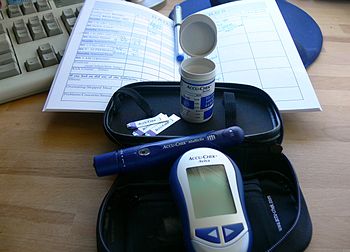 |
| (Photo credit: Wikipedia) |
With diabetes on the rise, doctors are extremely concerned about associated risks such as heart disease and stroke, which together kill two out of three people with diabetes. Fortunately, a recent study indicates that more people with diabetes are making the link between diabetes and their increased risk for heart disease and stroke.
According to a 2005 awareness survey conducted by the American Diabetes Association (ADA) and American College of Cardiology (ACC), 45 percent of people with diabetes understand their increased risk for heart disease, which is up from 35 percent in 2001.
Experts believe even more awareness is needed, however. The ADA and ACC continue to work together to share important information, tools and resources to encourage people with diabetes and health care providers to learn more about the impact of diabetes on the heart.
Other findings from the 2005 ADA/ACC awareness survey show:
• 69 percent know they may develop high blood pressure (38 percent in 2001).
• 64 percent know they are at risk for cholesterol problems (37 percent in 2001).
Importantly, more people with diabetes are talking to their health care providers about managing diabetes comprehensively:
• 45 percent of people with diabetes now have a goal for blood glucose levels (30 percent in 2003).
• 57 percent have a goal for blood pressure (34 percent in 2003).
• 61 percent have a goal for cholesterol (34 percent in 2003).
These figures are encouraging, but awareness may not be moving fast enough to keep pace with the growing prevalence of diabetes.
Recent statistics indicate diabetes has risen by over 14 percent since last estimates in 2003. The need for increased education and awareness about the link between diabetes and heart disease is now more critical than ever.
Armed with the best information, people with diabetes can properly manage their diabetes, understand their risks for complications such as heart disease and stroke, and take action to live a longer, healthier life.
(This is an older article, but still very informativ.)

No comments:
Post a Comment